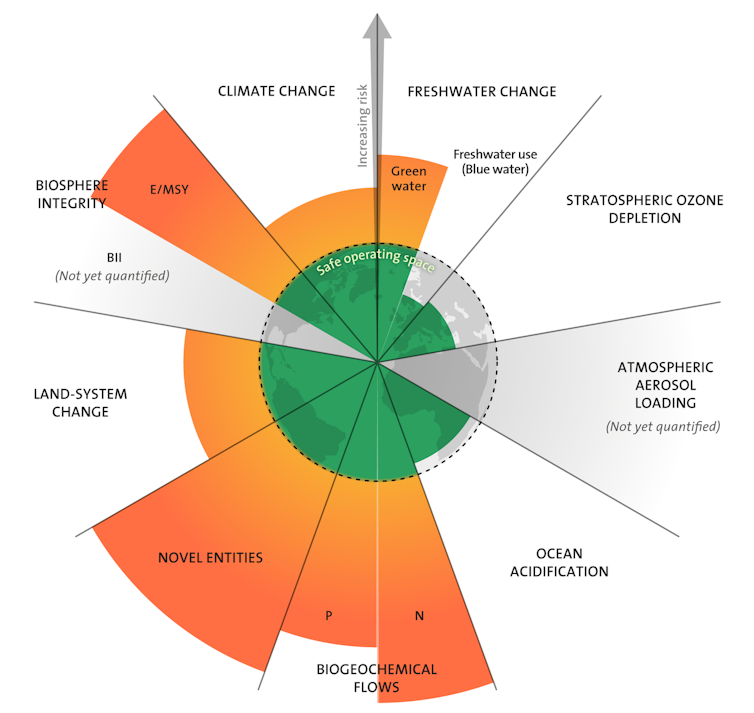Lorenzo Fioramonti, University of Surrey; Ida Kubiszewski, UCL; Paul Sutton, University of Denver, and Robert Costanza, UCL
The world population has just hit a new record: 8 billion. As is often the case, there are heated debates about the planet's so-called "carrying capacity" – the total number of people who can live on Earth sustainably. Experts are generally divided into two camps. There are those who argue that we need to drastically reduce the human population to avoid ecological catastrophe. And then there are those who believe that technology will find smart solutions without any need to actively tackle the issue head-on.
Scientists have been debating such demographic issues at least since the 18th century, when Thomas Malthus published An Essay on the Principle of Population, arguably the first global treatise on the relationship between population growth and scarcity. A few decades later, however, the Industrial Revolution (which the British economist had failed to anticipate) ushered the world into an era of abundance, relegating Malthus's grim predictions about the inevitability of scarcity to the margins of scientific debate.
In a bestselling book published in the late 1960s, The Population Bomb, Stanford professor Paul Ehrlich brought the topic back, advocating for immediate action to limit population growth on a finite planet. This recommendation was reiterated a few years later by the Club of Rome, an international network of scientists and industrialists. Its 1972 report The Limits to Growth aptly demonstrated the dynamic relationship between increasing consumption and the idea of "planetary boundaries" which cannot be crossed without risking severe environmental change.
 Of the nine planetary boundaries, six have been exceeded. Only ozone, freshwater use and ocean acidification remain in the 'safe' zone. Azote for Stockholm Resilience Centre, based on analysis in Wang-Erlandsson et al 2022, CC BY-SA
Of the nine planetary boundaries, six have been exceeded. Only ozone, freshwater use and ocean acidification remain in the 'safe' zone. Azote for Stockholm Resilience Centre, based on analysis in Wang-Erlandsson et al 2022, CC BY-SA It's true that some technologies have made production more efficient (think of fertilisers), thus alleviating the impact of population growth on resource use. But there is little doubt that the human race has massively overstepped the planetary boundaries, presently exceeding the safe operating space in six domains out of nine (see graphic above).
A smaller population could still be more destructive
It is difficult to estimate just how many humans the planet can carry sustainably, however. This is often overlooked in policy debates, which generally deal with the issue rather simplistically, resting on the assumption that increasing living standards will lead to lower birth rates. Therefore, the argument goes, the global population will decline as soon as continents like Asia and Africa reach similar development levels as Europe and North America
The fallacy here is to assume that only technology and population matter. These days environmental scientists generally agree that the overall impact is also a function of affluence (the so-called I=PAT equation). This can easily generate a paradox. Countries continue increasing their living standards by pushing up per-capita consumption, thus resulting in smaller populations but much bigger ecological impacts.
Take China. Its population growth rates have gone down significantly from 2.8% in the 1970s to the first decline in absolute terms this year. But in that period its overall consumption levels have increased enormously, resulting in a much worse net impact. The same applies to India and most emerging and developing economies. If this trend continues, we may end up with a smaller global population but significantly more destructive effects on the planet.
Developing a 'wellbeing economy'
The time has come to rethink our approach to affluence and develop different ways to improve living standards. In a new report to the Club of Rome titled Earth4All, we argue that countries (especially the most industrialised) should replace the pursuit of economic growth with broader measures of social and ecological wellbeing. This would result in a significant decrease in material consumption, while not undermining overall quality of life.
What might this involve in practice? Policies should encourage better work-life balance and gender equality, as women's empowerment is a key determinant of population growth. They should also optimise energy use and efficiency because the most renewable energy is what we do not need to use. We also need regenerative practices and homegrown solutions to manufacturing and food production (roughly 30% of food globally is either lost or wasted due to overconsumption and aesthetic standards).
Such a "wellbeing economy" approach would help all countries (including the poorest) leapfrog to a different type of development, able to combine high quality of life with very limited impacts on the environment. It is the difference between an extractive, linear economy that turns resources into emissions and a regenerative, circular economy that produces no waste because the output of any process becomes the input for another one.
There is massive room for improvement. After all, most of our wellbeing does not depend on material consumption (above a minimum sufficient level) but on the quality of our social relations and the environment in which we live. Ultimately, living better and more equitably will help us find the right balance also in terms of global population, without the need to impose restrictions.
Lorenzo Fioramonti, Founding Director, Institute for Sustainability, University of Surrey; Ida Kubiszewski, Associate Professor, Institute for Global Prosperity, UCL; Paul Sutton, Professor, Department of Geography and the Environment, University of Denver, and Robert Costanza, Professor of Ecological Economics, UCL
This article is republished from The Conversation under a Creative Commons license. Read the original article.